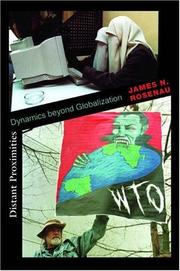| Listing 1 - 9 of 9 |
Sort by
|

ISBN: 1860943594 Year: 2003 Publisher: London Imperial College Press
Abstract | Keywords | Export | Availability | Bookmark
 Loading...
Loading...Choose an application
- Reference Manager
- EndNote
- RefWorks (Direct export to RefWorks)
Knowledge management --- Knowledge workers --- Technological innovations --- Management
Book
ISBN: 9781860949357 1860949355 Year: 2003 Publisher: London : River Edge, NJ : Imperial College Press ; Distributed by World Scientific,
Abstract | Keywords | Export | Availability | Bookmark
 Loading...
Loading...Choose an application
- Reference Manager
- EndNote
- RefWorks (Direct export to RefWorks)
This book provides an overview of recent, predominantly European, thinking on the issues and challenges for innovation management in the modern, knowledge-based economy. The topic is explored in four directions: the growing importance of services and of innovation in services; the growing interest in competence-based approaches of strategy and innovation; the role of technology in innovation processes; and the increasing importance of knowledge management in innovation management. Each direction is briefly introduced by the editor. The contributions come from universities and management school
Knowledge management --- Knowledge workers --- Technological innovations --- Management --- Knowledge management. --- Knowledge workers. --- Management.

ISBN: 1565848047 9781565848047 Year: 2003 Publisher: New York (N.Y.) New press
Abstract | Keywords | Export | Availability | Bookmark
 Loading...
Loading...Choose an application
- Reference Manager
- EndNote
- RefWorks (Direct export to RefWorks)
Intellectual property (International law) --- Intellectual capital --- Knowledge management --- 347.78 --- Auteursrecht --- 347.78 Auteursrecht --- Management of knowledge assets --- Management --- Information technology --- Organizational learning --- International law --- Capital, Intellectual --- Human capital --- Knowledge workers

ISBN: 0197562019 1280503033 0195347889 1423745957 9781423745952 9780195159509 0195159500 9780195347883 9786610503032 6610503036 Year: 2003 Publisher: New York : Oxford University Press,
Abstract | Keywords | Export | Availability | Bookmark
 Loading...
Loading...Choose an application
- Reference Manager
- EndNote
- RefWorks (Direct export to RefWorks)
In today's de-layered, knowledge-intensive organizations, most work of importance is heavily reliant on informal networks of employees within organizations. However, most organizations do not know how to effectively analyze this informal structure in ways that can have a positive impact on organizational performance. 'Networks in the Knowledge Economy' is a collection of readings on the application of social network analysis to managerial concerns.
Knowledge management --- Intellectual capital. --- Business networks. --- Business networking --- Networking, Business --- Networks, Business --- Social networks --- Industrial clusters --- Strategic alliances (Business) --- Capital, Intellectual --- Human capital --- Knowledge workers --- Management of knowledge assets --- Management --- Information technology --- Intellectual capital --- Organizational learning --- Social aspects. --- Social networks. --- Technology --- Communication in learning and scholarship. --- Economic aspects.

ISBN: 1843340372 1843340380 1780631936 9781780631936 9781843340386 9781843340379 Year: 2003 Publisher: Oxford Chandos
Abstract | Keywords | Export | Availability | Bookmark
 Loading...
Loading...Choose an application
- Reference Manager
- EndNote
- RefWorks (Direct export to RefWorks)
This book serves as a reference for individuals interested in knowledge management (KM) and educational issues surrounding KM. It looks at KM as an emerging profession and the need to educate a new generation of knowledge professionals to deal with managing knowledge on the one hand and managing knowledge workers on the other hand. In particular, it examines the skills and competencies of knowledge professionals; and how educational programs can address these demands - covering such issues as determining the optimal mix of subjects from the various disciplines that develop the requisite profes
025.1 --- 025.4 --- 025.4 Ontsluitings- en terugzoektalen. Classificaties. Thesauri. Metadata voor information retrieval --- Ontsluitings- en terugzoektalen. Classificaties. Thesauri. Metadata voor information retrieval --- 025.1 Bibliotheek: leiding, directie. Bibliotheekorganisatie. Bibliotheekmanagement --- Bibliotheek: leiding, directie. Bibliotheekorganisatie. Bibliotheekmanagement --- Knowledge management --- Knowledge Workers --- knowledge management --- Gestion des connaissances --- Travailleurs du savoir --- Training of --- Study and teaching --- Formation --- Etude et enseignement --- Knowledge management. --- Management --- Study and teaching. --- Administration --- Industrial relations --- Organization --- Management of knowledge assets --- Information technology --- Intellectual capital --- Organizational learning

ISBN: 9782718605920 2718605928 Year: 2003 Publisher: Galilée
Abstract | Keywords | Export | Availability | Bookmark
 Loading...
Loading...Choose an application
- Reference Manager
- EndNote
- RefWorks (Direct export to RefWorks)
Science --- Capitalism --- Sciences --- Capitalisme --- Social aspects --- Aspect social --- Arbeid --- Capital --- Information technology --- Intellectual capital. --- Progress. --- Science and civilization. --- Work --- Forecasting. --- Economic aspects --- Social aspects. --- Intellectual capital --- Progress --- Science and civilization --- Capital assets --- Fixed assets --- Economics --- Infrastructure (Economics) --- Wealth --- Social progress --- Civilization --- Regression (Civilization) --- Social stability --- Capital, Intellectual --- Human capital --- Knowledge management --- Knowledge workers --- IT (Information technology) --- Technology --- Telematics --- Information superhighway --- Natural science --- Science of science --- Civilization and science --- History and science --- Science and history --- Science and society --- Forecasting --- Economic aspects&delete& --- Natural sciences --- Marché du travail --- Sciences et société. --- Travail. --- Capitalisme. --- Valeur. --- Effets des innovations technologiques.

ISBN: 0791455793 0791487571 1417536012 9781417536016 9780791455791 0791455807 9780791455807 9780791487570 Year: 2003 Publisher: Albany State University of New York Press
Abstract | Keywords | Export | Availability | Bookmark
 Loading...
Loading...Choose an application
- Reference Manager
- EndNote
- RefWorks (Direct export to RefWorks)
A survey of contemporary Chinese intellectuals.
SOCIAL SCIENCE --- Ethnic Studies / General --- Professional employees --- Intellectuals --- Knowledge workers --- Business & Economics --- Labor & Workers' Economics --- Political activity --- China --- Intellectual life --- Politics and government --- Information workers --- Intelligentsia --- Professionals --- Employees --- Intellectual capital --- Persons --- Social classes --- Specialists --- S02/0220 --- S06/0437 --- S06/0500 --- S10/0330 --- S11/0534 --- China: General works--Intellectuals: after 1949 --- China: Politics and government--Policy towards intellectuals (incl. "thought reform", "brainwashing") --- China: Politics and government--Other modern political movements (e.g. anarchism, Socialism, dissident movements, Beijing Spring, Tian'anmen) --- China: Economics, industry and commerce--Employment --- China: Social sciences--Class studies

ISBN: 0691095248 069109523X 9780691095240 0691231117 Year: 2003 Publisher: Princeton, N.J. : Princeton University,
Abstract | Keywords | Export | Availability | Bookmark
 Loading...
Loading...Choose an application
- Reference Manager
- EndNote
- RefWorks (Direct export to RefWorks)
Has globalization the phenomenon outgrown "globalization" the concept? In Distant Proximities, one of America's senior scholars presents a work of sweeping vision that addresses the dizzying anxieties of the post-Cold War, post-September 11 world. Culminating the influential reassessment of international relations he began in 1990 with Turbulence in World Politics, James Rosenau here undertakes the first systematic analysis of just how complex these profound global changes have become. Among his many conceptual innovations, he treats people-in-the-street as well as activists and elites as central players in what we call "globalization." Deftly weaving striking insights into arresting prose, Rosenau traces the links and interactions between people at the individual level and institutions such as states, nongovernmental organizations, and transnational corporations at the collective level. In doing so he masterfully conveys how the emerging new reality has unfolded as events abroad increasingly pervade the routines of life at home and become, in effect, distant proximities. Rosenau begins by distinguishing among various local, global, and private "worlds" in terms of their inhabitants' orientations toward developments elsewhere. He then proceeds to cogently analyze how the residents of these worlds shape and are shaped by the diverse collectivities that crowd the global stage and that sustain such issues as human rights, corruption, the global economy, and global governance. Throughout this richly imaginative, fluidly written book, Rosenau examines how anti-globalization protests and the terrorist attacks on America amount to quintessential distant proximities. His book is thus a pathbreaking inquiry into the dynamics that lie beyond globalization, one that all thoughtful observers of the world scene will find penetrating and provocative.
International relations. --- Geografie --- Sociale geografie --- Maatschappij. --- POLITICAL SCIENCE / International Relations / General. --- Affirmative Locals. --- Buchanan, Patrick. --- Camdessus, Michel. --- Cuban exiles. --- Exclusionary Locals. --- Fidelity Investments. --- James, William. --- Mandela, Nelson. --- Microcredit Summit Campaign. --- National Basketball Association. --- Netanyahu, Benjamin. --- Nike corporation. --- acculturation. --- activists. --- adaptation. --- bargaining. --- behavioralism. --- birth control education. --- capital accumulation. --- centralization. --- charitable giving. --- churches. --- civic cultures. --- communications revolution. --- communitarian philosophy. --- currency transactions. --- cyclical processes. --- decentralization. --- distant proximities. --- drugs. --- economic globalization. --- education. --- epistemic communities. --- feedback loops. --- fragmegration. --- global structures. --- governance: and authority. --- habits. --- hackers. --- homogenization. --- human systems. --- identiscapes. --- imagined communities. --- indigenous peoples. --- knowledge workers. --- ladder of abstraction. --- legitimacy. --- militia groups. --- modernization. --- nationwide consensuses. --- nonlinear dynamics. --- Coexistence --- Foreign affairs --- Foreign policy --- Foreign relations --- Global governance --- Interdependence of nations --- International affairs --- Peaceful coexistence --- World order --- National security --- Sovereignty --- World politics --- Relacions internacionals.

ISBN: 0791458431 0791486249 1417538066 9781417538065 079145844X 9780791458440 9780791458433 9780791486245 Year: 2003 Publisher: Albany State university of New York press
Abstract | Keywords | Export | Availability | Bookmark
 Loading...
Loading...Choose an application
- Reference Manager
- EndNote
- RefWorks (Direct export to RefWorks)
Re-reads Marx in light of the contemporary critical interrogation of subjectivity.
PHILOSOPHY --- Political --- Economic Theory --- Business & Economics --- Marxian economics. --- Philosophy, Marxist. --- Economics --- Capitalism --- Intellectual capital. --- Production (Economic theory) --- Post-communism. --- Postmodernism. --- Subjectivity. --- Philosophy. --- Political aspects. --- Marx, Karl, --- Althusser, Louis, --- Subjectivism --- Post-modernism --- Postmodernism (Philosophy) --- Postcommunism --- Capital, Intellectual --- Marxian philosophy --- Marxist philosophy --- Marxist economics --- Altiser, Luj, --- A'erdusai, --- Altouser, Loui, --- Al'ti︠u︡sser, Lyu, --- Atuse, --- Atuse, Luyi, --- Marx, Karl --- Knowledge, Theory of --- Relativity --- Arts, Modern --- Avant-garde (Aesthetics) --- Modernism (Art) --- Philosophy, Modern --- Post-postmodernism --- World politics --- Communism --- Microeconomics --- Supply and demand --- Demand (Economic theory) --- Supply-side economics --- Human capital --- Knowledge management --- Knowledge workers --- Communism and philosophy --- Schools of economics --- Socialism --- Intellectual capital --- Marxian economics --- Philosophy, Marxist --- Post-communism --- Postmodernism --- Subjectivity --- Political aspects --- Philosophy --- Althusser, Louis --- Marx, Karl. --- Makesi, --- Ma-kʻo-ssu, --- 马克思, --- 馬克思, --- Marukusu, --- マルクス, --- Marx, Heinrich Karl, --- Marks, Karl, --- Marx, Carlos, --- Marks, K. --- Marŭkʻŭsŭ, Kʻal, --- 마르크스, 칼, --- Marksŭ, --- 맑스, --- Marks, Karol, --- Mác, Các, --- Marx, Karel, --- Marksas, Karolis, --- Marx, Carlo, --- Mác, C., --- מארכס, --- מארכס, קארל, --- מארכס, קרל, --- מארכס, ק --- מארקס --- מארקס, קארל --- מארקס, קארל, --- מארקס, קרל, --- מארקס, ק. --- מרכס, קרל --- מרכס, קרל, --- ماركس، كارل --- ماركس، كارل، --- Markso, Karlo, --- Capitalism - Political aspects
| Listing 1 - 9 of 9 |
Sort by
|

 Search
Search Feedback
Feedback About UniCat
About UniCat  Help
Help News
News